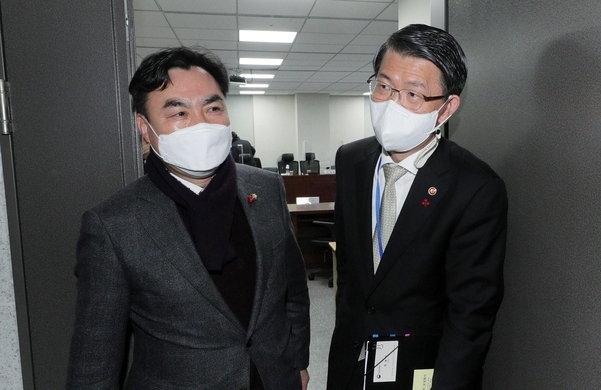FSC chief denies political consideration on short selling ban extension
By Choi Jae-heePublished : Feb. 17, 2021 - 14:52

Financial Services Commission Chairman Eun Sung-soo said Wednesday that there were no political considerations at play in the regulator’s latest decision to extend its temporary ban on short selling, stressing that the practice a “necessary” trading tactic.
“Even tough retail investors have voiced against short selling, the authorities reached a conclusion that short selling is a necessary trading tactic in the stock market,” Eun said at a parliamentary briefing, vowing to address day traders’ concerns over illegal practices of short selling. One such practice, known as naked short selling, involves shorting stocks without actually borrowing the shares.
Earlier this month, the FSC unveiled its plan to prolong the ongoing short sale ban until May 2 and allow a partial resumption of short-selling on Kospi 200 and Kosdaq 150 stocks from May 3.
“Even tough retail investors have voiced against short selling, the authorities reached a conclusion that short selling is a necessary trading tactics in the stock market,” Eun said at a parliamentary briefing, vowing to address day traders’ concerns over illegal practices of short selling. One such practice, known as naked short selling, is shorting stocks without actually borrowing the shares.
The FSC is planning to implement a system that detects illegal short selling at the Korea Exchange and local brokerages and toughen penalties on illicit short sales, he added.
Meanwhile, in a step to promote the Moon administration’s “New Deal” scheme, the nation’s top financial regulator on Wednesday vowed to fund a combined 17.5 trillion won ($15 billion) to local firms operating related business portfolios by the end of this year.
The Korean New Deal initiative is a national development strategy announced in July last year, which aims to reshape the local economy in the post COVID-19 era by promoting green growth initiatives and digital transformation across industries.
“(The FSC) will ensure continuing support for the local finance sector to help South Korea leap to a pacesetting economy,” said Financial Services Commission Chairman Eun Sung-soo at a parliamentary briefing.
“Along with setting up a state-run New Deal fund worth 4 trillion won, (the FSC) will inject an 18 trillion won policy fund to boost New Deal business areas,” Eun added.
The envisioned policy fund designed to finance companies in green and digital areas consists of loan programs worth 11.9 trillion won as well as 200 billion won in investment from state-run financial institutions and government guarantees up to 5.4 trillion won, the FSC said.
The move is part of the government’s plan to supply 170 trillion won or more to New Deal projects over the next five years in cooperation with the private financial institutions through various channels, including government-backed loans or investment funds.
Responding to the prolonged COVID-19 crisis, the FSC is likely to extend its loan repayment moratorium initially scheduled to expire on March 31 for another six months until the end of September.
On Tuesday, Eun and the heads of five major banking giants here reached a consensus on a further extension of loan repayment moratoriums.
“After hearing different voices from the finance and industry circles, (the FSC) will announce a policy framework this month regarding temporary financial stimulus packages, including loan repayment moratoriums,” Eun said.
By Choi Jae-hee (cjh@heraldcorp.com)


















![[KH Explains] Hyundai's full hybrid edge to pay off amid slow transition to pure EVs](http://res.heraldm.com/phpwas/restmb_idxmake.php?idx=652&simg=/content/image/2024/04/18/20240418050645_0.jpg&u=20240418181020)

![[Today’s K-pop] Zico drops snippet of collaboration with Jennie](http://res.heraldm.com/phpwas/restmb_idxmake.php?idx=642&simg=/content/image/2024/04/18/20240418050702_0.jpg&u=)